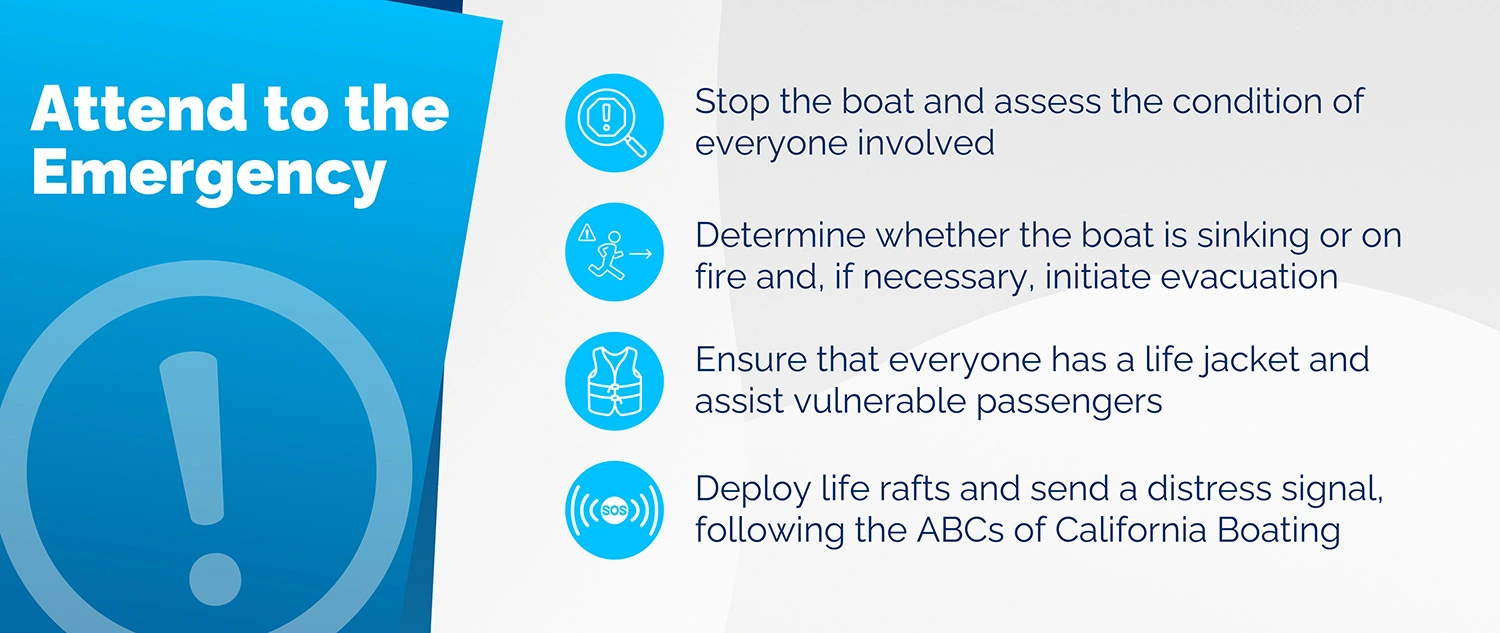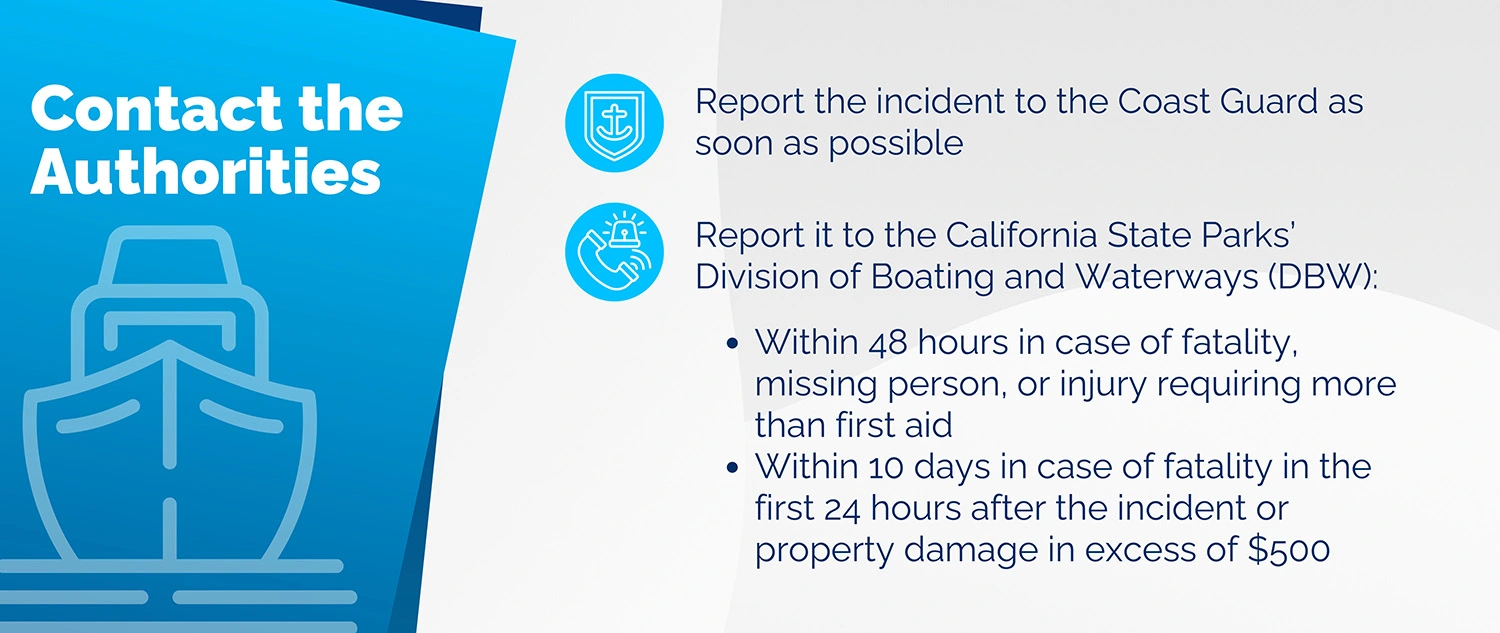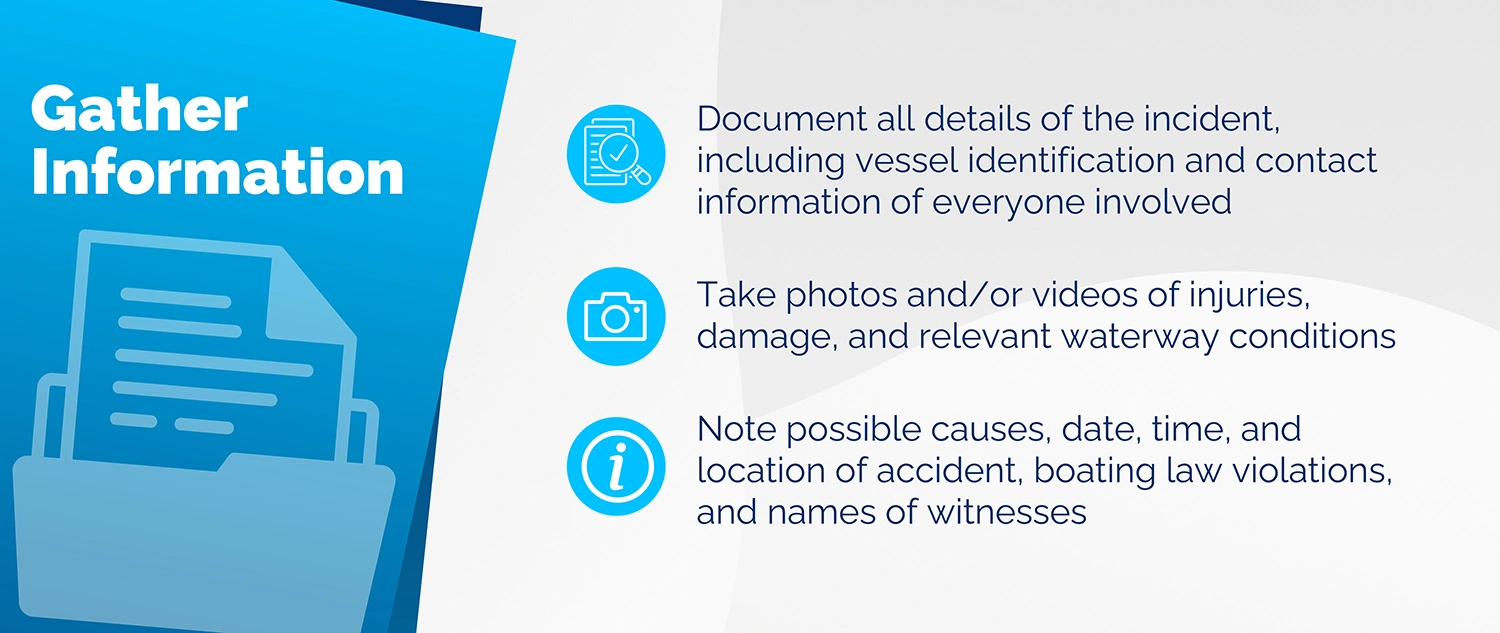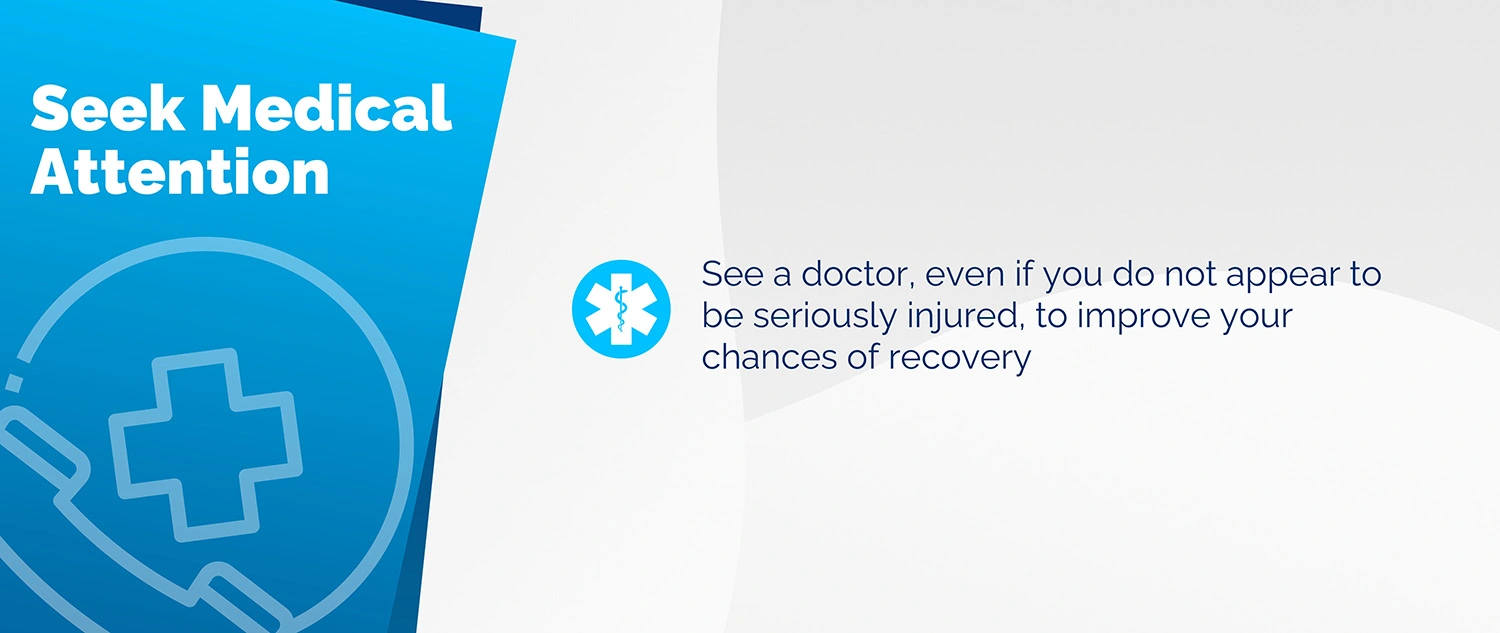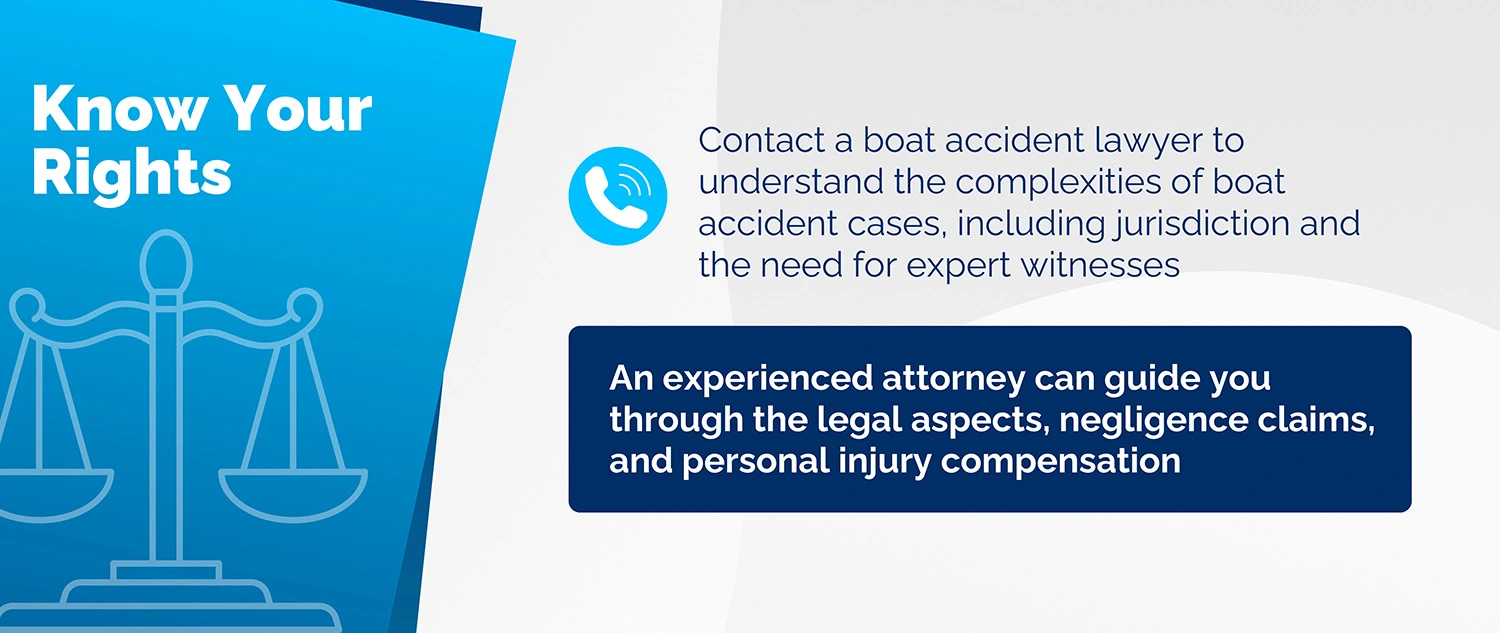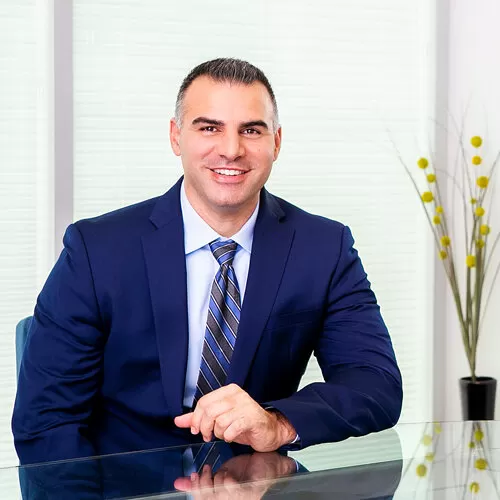Injured On The Waters Of Southern California? Our Firm Can Help
When you go out for a day on the water, whether to swim, enjoy recreational activities, or simply drive your boat, you expect other boaters to be safe and courteous. Unfortunately, not everybody knows how to drive a boat properly or safely.
If you were injured in a boat accident caused by the negligence of another, you may be entitled to compensation to help with the cost of medical expenses, lost income, or other damages.
Our team of experienced boating injury lawyers are ready to fight for you to recover the maximum compensation allowed under the law.
We offer a sound, team-oriented approach when handling personal injury cases involving boat accidents. Not only can our attorneys advocate for you at trial, but they can also guide you through the entire process with compassion and empathy.
Talk to a Los Angeles boat injury attorney about your case or contact our firm to schedule a no-cost consultation.
Schedule Your Free Boat Accident Case Evaluation

Boat Accident Resources In This Article:
- What Should You Do After Being Involved in a Boat Accident?
- Boat Accident FAQ
- Common Causes of Boat Accidents
- What Laws Apply to Boat Accidents in California?
- Who May Be Responsible For Causing a Boat Accident Under California Law?
- How To Find The Right Los Angeles Boat Accident Attorney
What Should You Do After Being Involved in a Boat Accident?
In this section:
- Attend to the Emergency
- Contact the Authorities
- Gather As Much Information As You Can
- Seek Medical Attention
- Know Your Rights — Contact a Boat Accident Lawyer
1. Attend to the Emergency
In the event of a boat accident, the boat operator’s priority should be to assess the well-being of everybody involved in the crash. He or she should stop the boat at the collision scene and assess the following:
- Is anybody missing?
- Is anybody injured?
- Is the boat sinking or on fire? If so, are evacuation measures underway?
- Does everybody have a life jacket?
- Are there any vulnerable passengers who may require assistance?
- Have life rafts been deployed?
- Has a distress signal been sent out to make other vessels in the vicinity aware of your presence?
All boat operators should be familiar with the ABCs of California Boating. In particular, Section 5: Emergency and Accident Procedures, which provides instructions on how to radio for help when in distress. This includes transmitting the International Distress Call “MAYDAY MAYDAY MAYDAY — THIS IS ___”, followed by your call sign repeated three times. Then:
If you are aboard the vessel in trouble, state:
1. WHO you are (your vessel’s call letters and name).
2. WHERE you are (give your vessel’s position in latitude/longitude or true bearing and distance in nautical miles from a widely known geographical point). Remember that local names known only in the immediate vicinity are confusing.
3. WHAT the problem is aboard your boat.
— Emergency and Accident Procedures, ABCs of California Boating
The person calling in the emergency should also describe the type of assistance that is needed, the number of people aboard, and the present seaworthiness of the vessel.
If you are not the one operating the vessel, you should (if you can) offer your assistance to ensure the proper rescue measures are carried out.
2. Contact the Authorities
You should report the incident as soon as possible to the proper authorities, including the Coast Guard.
A report must be submitted to the California State Parks Division of Boating and Waterways (DBW) within 48 hours of the incident if:
- It resulted in the death of somebody within 24 hours of the incident
- Somebody is missing
- Injuries were sustained requiring more than first aid
A report must be submitted within 10 days if:
- It resulted in the death of somebody after 24 hours of the incident
- There is property damage in excess of $500, or a vessel is completely lost
3. Gather As Much Information As You Can
Much like accidents that take place on the land, you should take the time to document as many details about the incident as you can. If possible, get the contact information of everybody involved, including names and current addresses and identification numbers/registration information of all vessels involved in the incident. Then, if you can, take photographs/videos of things that could be needed. Some suggestions of evidence to capture include:
- Any injuries sustained
- The extent of the damage to all vessels involved in the collision
- Any issues on the waterway that were readily apparent
- Whether the boat operator was behaving recklessly, for example overtaking another vessel unsafely or under the influence
In addition, you may wish to take note of the following, especially if one or more of the boat operators involved in the accident failed to stop or is refusing to cooperate:
- What you believe may have caused the incident
- The date and time the accident took place
- Where the accident took place. Be as specific as possible:
- Which waterway?
- Which part of the waterway?
- Were you in a designated swimming zone?
- What flags or buoys were in the vicinity, such as a diver down flag/alpha flag?
- Whether the boat operator was compliant with the federal lateral system of buoyage; that is, were they proceeding on the correct “side” of the waterway?
- The weather conditions, such as fog or choppy waters
- The names of any witnesses
4. Seek Medical Attention
Even if you believe you have not sustained any serious injury, it is important that you seek medical attention if necessary. The sooner you can have a physician assess your condition after the accident, the better chance of a medical recovery you may have.
5. Know Your Rights — Contact a Boat Accident Lawyer
Boat accident cases can be complex to navigate. There are many factors that will need to be accounted for, including whether the case falls under federal or state jurisdiction. Additionally, expert witnesses such as weather analysts may need to be brought in to establish the details of the incident.
An experienced boat accident attorney can provide you with legal guidance concerning every aspect of your case. They will be able to advise you on the boating laws that apply to your accident, whether a liable party acted negligently in causing the incident, and personal injury compensation that may be due as a result of your injuries.
Jump to this section for more information on how to find the best boat injury lawyer for your circumstances.
Boat Accident FAQ
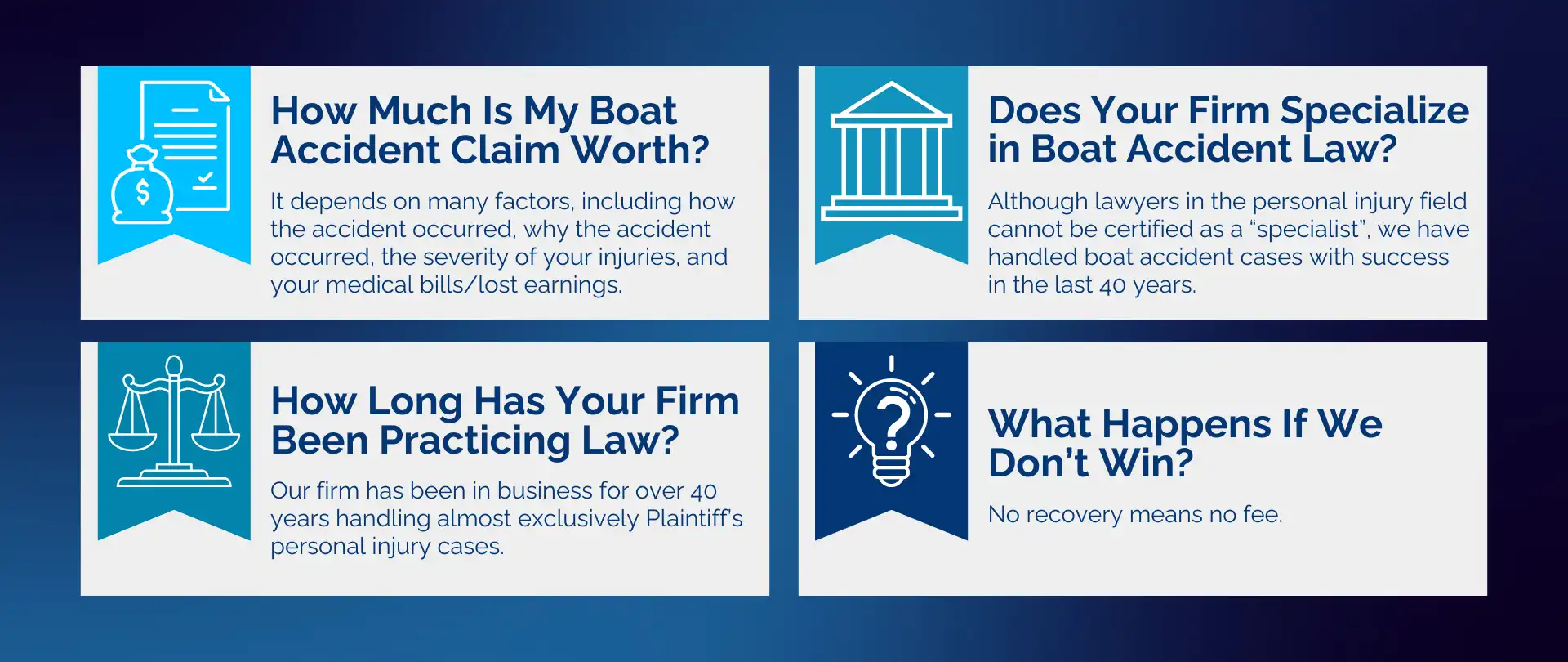
Q: How Much Is My Boat Accident Claim Worth?
A: It depends on many factors, including how the accident occurred, why the accident occurred, the severity of your injuries, and your medical bills/lost earnings.
Q: Does Your Firm Specialize in Boat Accident Law?
A: Although lawyers in the personal injury field cannot be certified as a “specialist”, we have handled boat accident cases with success in the last 40 years.
Q: How Long Has Your Firm Been Practicing Law?
A: Our firm has been in business for over 40 years handling almost exclusively Plaintiff’s personal injury cases.
Q: What Happens If We Don’t Win?
A: No recovery means no fee.
Common Causes of Boat Accidents
Over the years, we have seen and represented many different types of boat accidents. Distracted or drunk drivers are two of the most common causes of preventable accidents on the water. Our goal is to gather as much information about the incident as possible in order to recreate the accident. Our Los Angeles boat accident lawyers are known both for our dedication to building strong cases and for achieving proven results and verdicts.
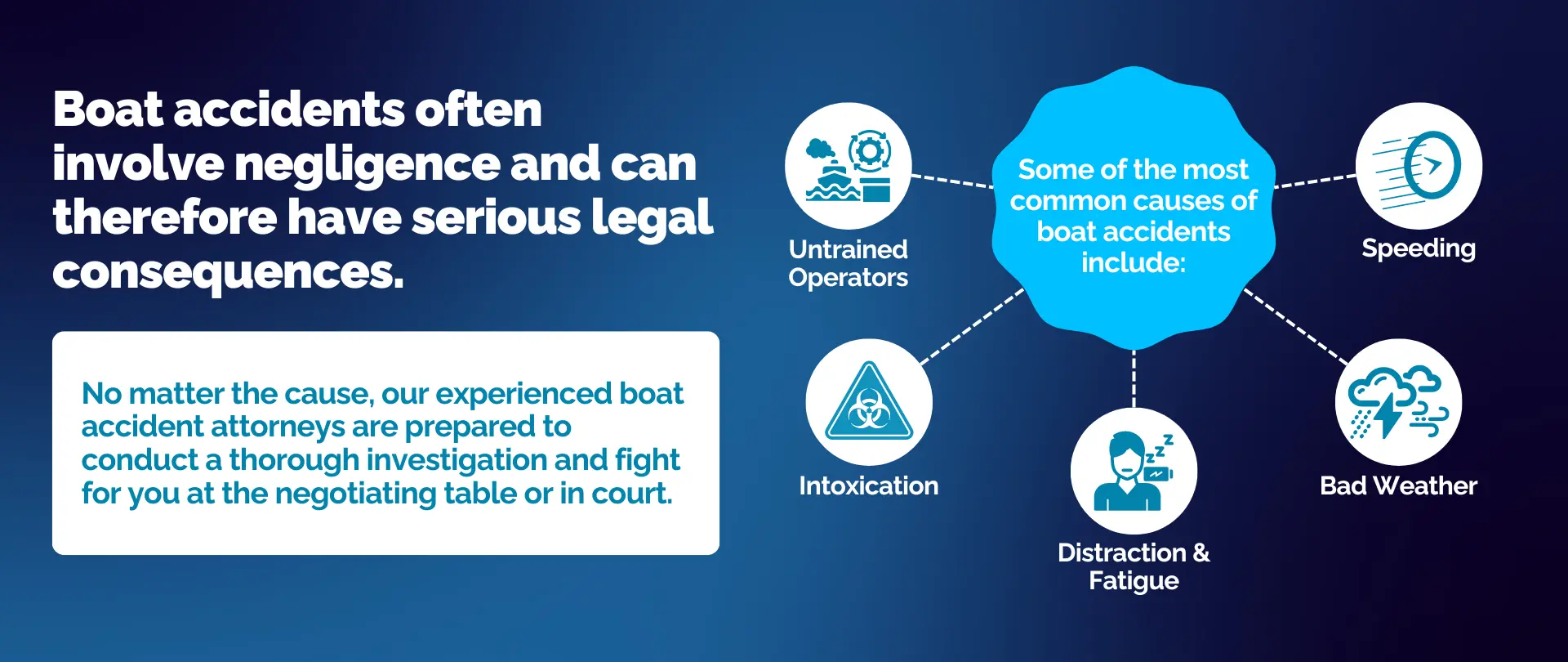
A few other common causes of boating accidents include:
- Untrained boat operator
- Boat operators under the influence
- Under-rested or distracted boat operators
- Unstable weather conditions
- Reckless boat operation (speeding)
No matter the details of your accident, our experienced boating accident attorneys understand what you are going through. We can conduct a thorough investigation of the circumstances of the accident, including gathering relevant evidence, such as witness testimony.
Our Los Angeles boat accident attorneys can then prepare a solid case to present in settlement negotiations or at trial. We have represented seriously injured clients in many different types of drowning and boat accidents and our firm is prepared to fight for you.
What Laws Apply to Boat Accidents in California?
The law regarding boat accidents is often not as straightforward as it is for other personal injury cases, as the waterway on which the accident occurred can determine whether the case is handled at the state or federal level.
This will be the first question you need to answer in determining what laws will apply to the boat accident you were involved in.
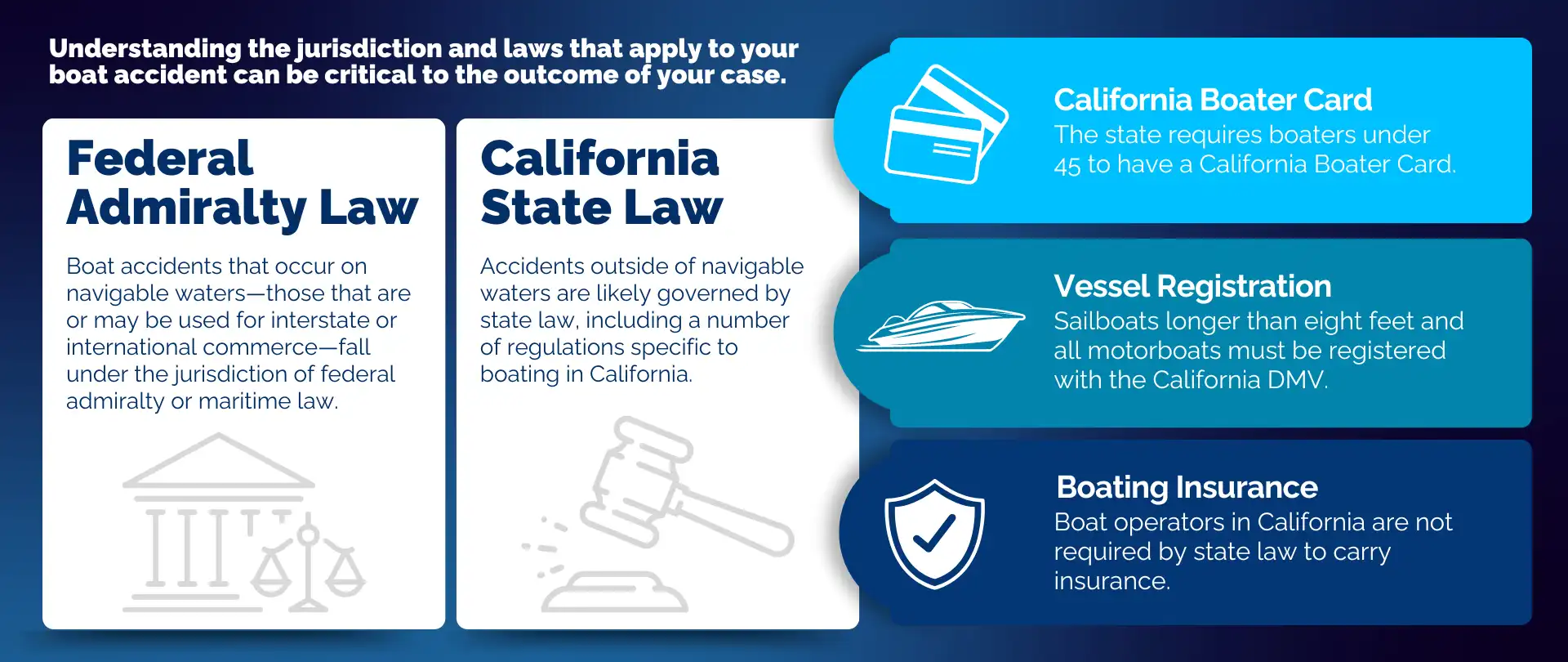
Generally speaking, your case will likely fall under federal admiralty jurisdiction if it meets the locality plus test applied in maritime law. Part of this test includes determining whether the accident occurred on navigable waters. FindLaw attempts to define what is a navigable water:
Are “those waters that are subject to the ebb and flow of the tide and/or are presently used, or have been used in the past, or may be susceptible for use to transport interstate or foreign commerce.”
If your accident did not occur on a navigable waterway, then your case probably falls under state law, in which case there are a number of basic requirements under California boating laws that must be taken into consideration:
- As of January 1, 2022, all persons aged 45 and younger must carry a California Boater Card. The California Boater Card provides proof that the holder has completed mandatory safety training, and must be carried on board at all times. Failure to present the card when requested by an enforcement officer can result in a fine.
- Sailboats over eight feet long and any motor-powered vessel, regardless of size, must be registered with the DMV.
- It is not a legal requirement for a boat to be insured in California.
Understanding how these various legal considerations apply to your boat accident can have a dramatic impact on the outcome of your case. If you are unsure about any of the points listed above, you should speak to an experienced boat accident attorney, who can advise you on how best to proceed.
Who May Be Responsible For Causing a Boat Accident Under California Law?
There are numerous factors that can cause a boat accident or contribute to the injuries suffered by those involved in a boat accident. Such factors might include hitting the wake of another boat, failing to pay attention to other watercraft, failing to ensure that the proper number of life preservers are on board, and allowing the watercraft to fall into a state of disrepair.
In order to recover damages from injuries incurred as a result of a boating accident, you would need to demonstrate that those injuries were caused by the negligence of another party. In many cases, you would need to secure legal counsel to give you the best chance of successfully navigating the laws.
Here are some of the parties who may bear liability for a boating accident:
Boat Operators
If the person operating the boat was negligent in driving the boat, he or she may be held liable for the damages caused by the accident. There are a number of ways in which a boat accident may be caused through operator error. These include speeding, inattentiveness, intoxication, inexperience, and violation of navigation rules.
Boat operators must also be aware of the hazard posed by the wake of another boat and take steps to mitigate this risk. The driver may be held liable for injuries suffered by a passenger as a result of impact with a wake, including where a passenger is thrown from his or her seat or overboard.
Boat Owners/Rental Companies
The owner of the boat may be held liable if they rented the boat to an individual who should not be operating a vessel, for example if they were intoxicated or could not present a valid license, or if they rented the boat in an unseaworthy condition. They may also be liable if they failed to provide adequate safety equipment, such as life jackets, fire extinguishers, and radio equipment for signaling distress in an emergency. They could also be liable for failing to properly maintain, repair, and/or inspect the boat.
Boat Manufacturers
Boats are subject to product liability laws, meaning that any party involved in manufacturing, distributing, designing, or selling a boat may be responsible if the product contained a manufacturing, design, or warning defect.” This includes failing to provide adequate instructions or warnings concerning the vessel.
In 2019, the U.S. Supreme Court expanded this product liability, ruling that maritime tort law allows boat manufacturers “to be sued for modifications to their products made by a third party” if the manufacturer had knowledge or intention of those modifications. This ruling occurred after a suit was brought by two Navy veterans who were allegedly exposed to Navy-installed asbestos while aboard a manufacturer’s vessel(s) and consequently suffered terminal cancer.
Other Passengers
Passengers who do not own the vessel in question may still be found responsible for a boating accident if they are found to have acted recklessly or negligently, “such as throwing someone in the water without a life vest, knowing the person cannot swim, or operating the boat in an unsafe condition.”
Other Waterway Users
All of the factors outlined above for boat operators also apply to other waterway users. For instance, inattentiveness on the part of other people operating nearby watercraft can lead to accidents, in which case they may be the ones to bear the responsibility for the collision.
Another vessel driving at a speed greater than allowed on the lake or river carries the added danger of leaving a larger wake, which can cause other watercraft to capsize or flip. If the operation of another waterway user was the reason for the injuries you sustained, they may be liable for damages.
Local Government
Government agencies may be held liable if an accident was caused by failure to alert individuals to dangerous conditions on their waterways, for example through placement of warning buoys, storm warning flags, safe water aids, or special marks.
You
If you were partially responsible for causing the boat accident, you may still be entitled to damages. Through determining comparative negligence, you may be able to recover damages relative to the extent to which the blame can be attributed to another party.
Determining comparative negligence can be a complicated endeavor, and it is recommended that you consult with a legal professional in order to determine exactly what you may be able to recover.
–
Regardless of who is ultimately at fault, you should consult with an experienced boat accident lawyer who can advise you on your legal rights.. Whether it was the boat operator, a rental company, or another party, if you are to recover damages you will likely need to demonstrate their negligence. That means demonstrating:
- The responsible party owed you the duty to exercise a reasonable degree of care;
- That the responsible party failed to exercise that duty of care; and
- That the failure to exercise reasonable care contributed to your injuries
Demonstrating the negligence of another party can entail a complex and time-consuming litigation process. You should contact an experienced boat accident attorney who can answer any questions you may have about your potential lawsuit.
Liability for Uninsured Boat Operators
It is not a legal requirement for boat operators to carry insurance in California. Therefore, unlike with car or motorcycle accidents, the collectability of a recovery could be limited.
You should consult with an experienced boat injury attorney, who will guide you through the options available in recovering damages as a result of a boat accident.
How To Find The Right Los Angeles Boat Accident Attorney
While there is no doubt that there are many fine law firms throughout LA County, it is a simple fact that only certain firms are able to go the distance. Sadly it is often the case that a firm with the law on their side loses because the opposition is able to beat them through sheer resource.
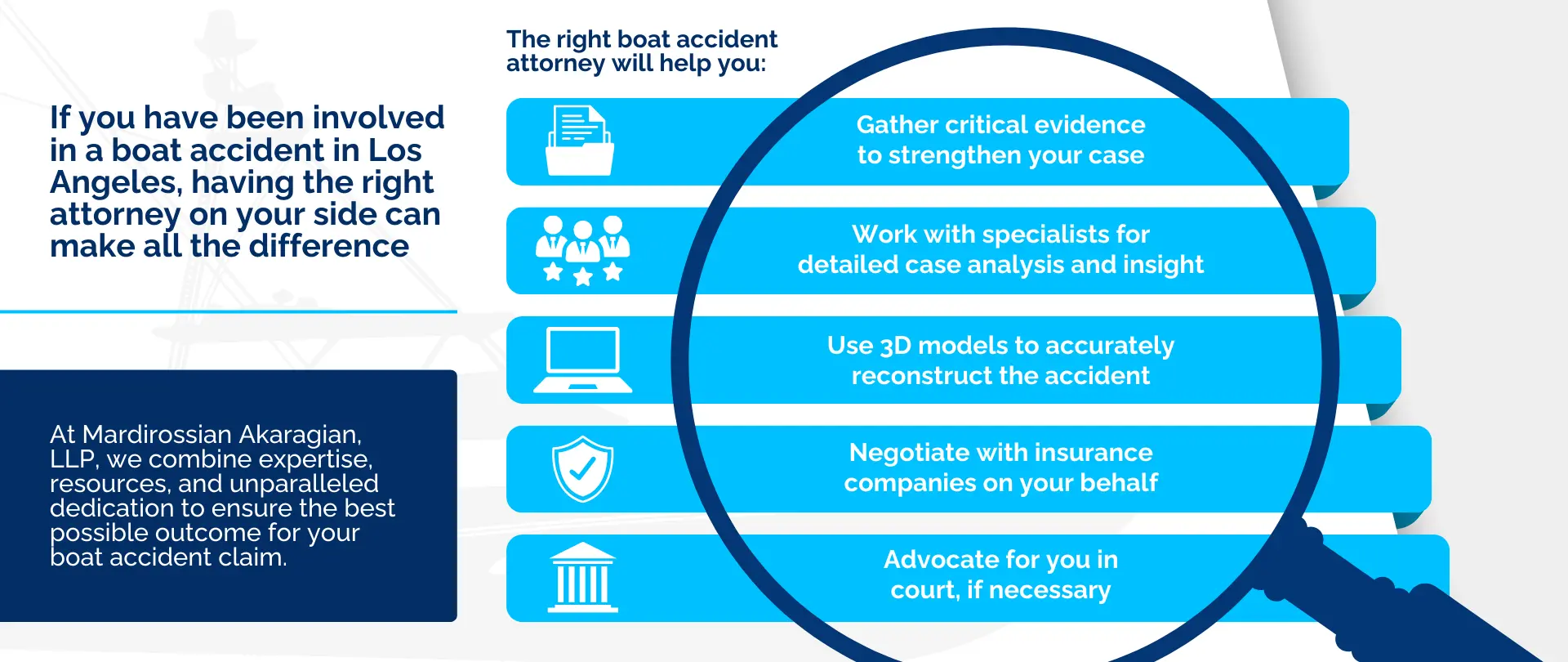
Mardirossian Akaragian LLP is a powerhouse law firm with the necessary resources needed to go the distance. With a track record of major case victories and a combined total of over half a billion dollars secured for our injury clients, your boating injury claim is in the right hands with us.
Ways Our Firm Can Help With Your Boat Accident Claim
We can conduct a thorough investigation of the circumstances surrounding your accident, helping you to build a solid case by:
- Gathering evidence, such as witness statements, police reports and medical documents
- Working with accident reconstructionists, engineers, medical professionals, forensic economists and other qualified experts
- Reconstructing the accident through our signature use of virtual and physical 3D models
- Communicating with insurance companies (where applicable)
- Taking your case to trial if necessary
Let Our Firm Fight for Your Rights and Your Future
We offer a sound, team-oriented approach when handling personal injury cases involving boat accidents. Not only can our attorneys aggressively advocate for you in settlement or trial, but they can also guide you through the entire process with compassion and empathy. We understand the difficult situation you are in and it’s our goal to help you recover the fair compensation you are owed.
With more than 40 years of combined experience, our Los Angeles boat accident attorneys are focused on recovering the maximum compensation on your behalf, whether through settlement or at trial. We understand that boating accidents can cause immeasurable damage. We handle every aspect of your claim from start to finish so you can focus on getting the treatment you need.
Our firm offers exceptional talent, abundant resources, tireless dedication, and years of experience to give you the best chance of success in obtaining maximum compensation. Led by our award-winning attorneys Garo Mardirossian and Armen Akaragian, we are prepared to provide you with aggressive representation and personalized legal guidance you need.
Talk to a Los Angeles boat accident lawyer about your case or contact our firm to schedule a no-cost consultation.
Schedule Your Free Boat Accident Case Evaluation
ARTICLE BY
ARMEN AKARAGIAN
Admitted to practice in 2006, Armen has arbitrated, tried, and settled several cases which have resulted in multi-million dollar verdicts and settlements.
Sources cited in this article:
-
ABCs of California Boating – California State Parks Division of Boating and Waterways
-
Mayday – Wikipedia
-
Call Sign Definition & Meaning – Merriam-Webster
-
Latitude and Longitude – Britannica
-
Heading vs Course vs Bearing – Boat Safe
-
What is the difference between a nautical mile and a knot? – National Ocean Service
-
ABCs of California Boating: Emergency and Accident Procedures – California State Parks Division of Boating and Waterways
-
About the U.S. Coast Guard – United States Coast Guard
-
Reporting Boat Accidents – California State Parks Division of Boating and Waterways
-
California Division of Boating and Waterways – Wikipedia
-
Diver down flag – Wikipedia
-
ABCs of California Boating: Waterway Markings – California State Parks Division of Boating and Waterways
-
Locality-Plus Test Law and Legal Definition – USLegal, Inc.
-
33 CFR Part 329 Definition of Navigable Waters of the US – US Army Corps of Engineers
-
FAQs California Boater Card – California Boater Card
-
Boat/Vessel Registration – DMV California
-
California Boat Insurance | Cost, Coverage, and More | Trusted Choice – Trusted Choice
-
What is Seaworthiness And Why it is Important? – Marine Insight
-
The Product Liability of Boats and Boatbuilders – Passage Maker
-
Why Is It Dangerous For Your Boat To Produce A Large Wake – Boating Narrative
-
Navigation Buoys | Safe Boater – Safe Boater
-
Storm Warning – Wikipedia
-
U.S. Aids to Navigation System – U.S. Coast Guard
-
IALA Buoyage System For Mariners – Different Types Of Marks – Marine Insight
-
What is Comparative Negligence? – FindLaw
-
Elements of a Negligence Case – FindLaw
